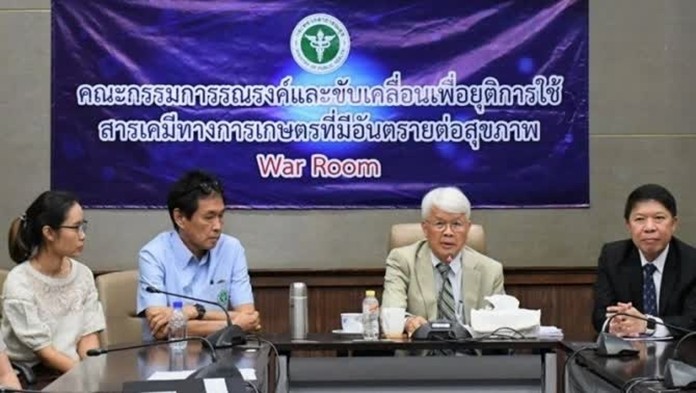
The Ministry of Public Health is to campaign to stop the use of harmful chemicals in agriculture, pointing out the harmful health effects. The MOPH is now set to inform its officials of its stance on the matter before they attend the Hazardous Substance Committee’s meeting at which a decision on the proposed ban will be made on 22nd October.
ML Somchai Chakrabhand, an adviser to the Minister of Public Health has chaired a meeting with the campaign committee formed to address harmful chemical usage in agriculture; the committee will continue its campaign against such harmful chemicals by pointing out the dangerous health effects they have. The campaign will take place on a variety of media channels until 21st October, the day before the meeting of the Hazardous Substances Committee.
A lecturer at Chulalongkorn University’s Faculty of Medicine, Teerawat Hemachuta, also an adviser to the Minister of Public Health, said today that studies show clear indications of the negative effects of harmful chemicals used in agriculture, with similar patterns occurring worldwide.
He said studies and research show that contamination from the chemicals in the food chain can cause diseases such as cancer, Parkinson’s, cerebral atrophy, slow child development, abnormal organ functions, and respiratory failure. Paraquat is ranked the most dangerous, followed by Glyphosate, of which only 200 milliliters intake into the body can cause acute Alzheimer’s, while Chlorpyrifos, can cause breathing difficulties and abnormal organ function.
Some studies also examined children in whom traces of these chemicals were revealed, as a result of contamination of the placenta, the amniotic fluid, and meconium after birth, noting that they usually suffer from slow development, and exhibit an Attention Deficit Hyperactivity Disorder.
Banning these three chemicals is intended to protect farmers and their families from harm caused by these chemicals. According to the MOPH’s data from October 2018 to July 2019, 406 fatalities have been attributed to the use of chemicals in Thailand, covering some 280 varieties, along with 15,000 cases of hospital admissions related to the use of chemicals. Deleterious health effects greatly intensify when all three chemicals are involved.
 |
 |
 |





